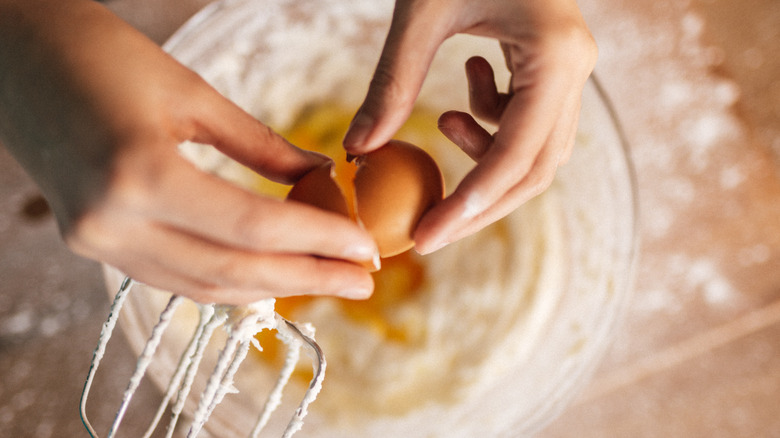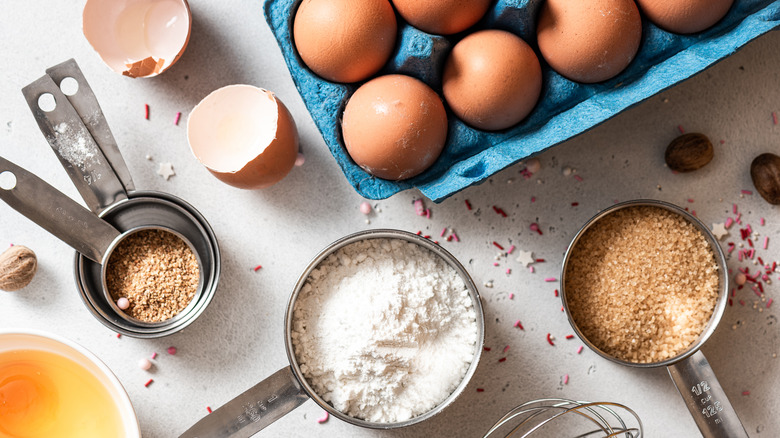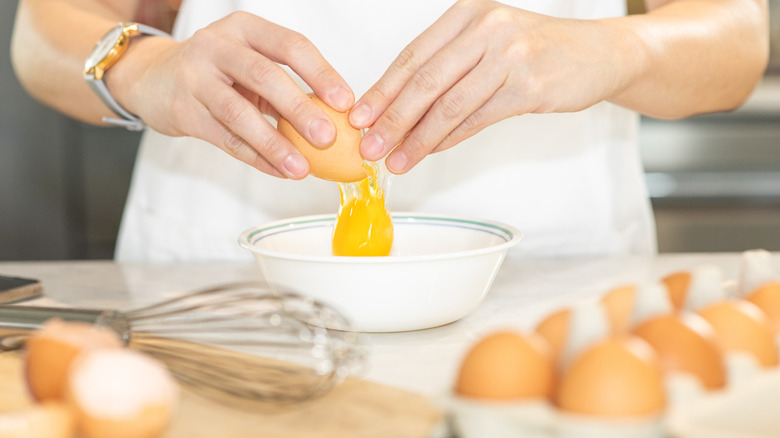What Size Eggs To Use When Recipes Don't Specify
When it comes to baking, precision is critical. Reliable recipes detail dry ingredients in grams and liquids in fluid ounces, but when it comes to the incredible edible egg, recipes can be vague, and despite what you heard, size does matter.
Grocery stores stock eggs in various sizes — medium, large, extra large, and jumbo, not to mention brown and white and all the different price points and classifications. While it doesn't matter which size you buy when making an omelet or beating an egg wash, when it comes to baking, eggs play several vital roles and can affect the recipe's outcome. Unless specified, bakers should use large eggs — the standard cooks use to develop recipes. Different-sized eggs can fluctuate slightly in volume, even within the same size, so it's best to be consistent.
A medium egg contains 1.75 ounces or 3 ½ tablespoons, while a large egg has roughly 2 ounces or 4 tablespoons of liquid. Extra-large eggs contain 2.25 ounces or 4.5 tablespoons of liquid, and jumbo eggs have 2.5 ounces or 5 tablespoons of liquid. While the difference between each egg may seem minuscule, when baking a giant batch of cookies for a holiday, 12 large eggs add 24 ounces to the recipe. In contrast, extra-large eggs add 27 ounces, which is a big difference in baking.
What do eggs do in baking?
Depending on the recipe, eggs leaven, bind, and add texture, structure, flavor, color, nutrition, and volume to baked goods. In recipes like soufflés, sauces, custards, and mayonnaise, eggs are emulsifiers, thickening food to provide a luscious consistency and mouthfeel. Too little egg will create a looser result, while too much can create a stiff sauce.
For cookies, eggs hydrate and bind the dough. While using a single extra-large egg instead of a large one won't change the recipe much, downgrading from a jumbo egg to a medium egg would lose almost an ounce of liquid, creating dry, brittle cookies. In contrast, using too much egg in a cookie recipe can make chocolate chip potato chip cookies cakey. As the volume increases, so does the risk of altering the results.
With cakes, eggs contribute to the viscosity and stability of the batter and affect the moisture, crumb density, height, and overall texture. The yolk adds fat and richness to cakes, while meringue and angel food cakes rely on whipped egg whites for volume. Adding too much egg to a batter can produce a rubbery texture, while not enough prevents the cake from rising, creating a dense, low cake.
How to substitute different size eggs
When baking, weighing ingredients provides the most accurate measurements for more consistent results, particularly compared to the quick "scoop and level" flour method we've all been guilty of. While good recipes are often written as 120 grams of all-purpose flour versus 1 cup, eggs are usually written in units.
If substituting a larger or smaller egg in a recipe or cutting a recipe in half that now requires ½ an egg, weighing the liquid is the most accurate solution. Kitchen scales are inexpensive tools that professional bakers rely on, and this method also comes in handy when using a carton of liquid whole eggs or egg whites from the supermarket.
Lightly beat the eggs until the yolks and whites are combined, and weigh the liquid to the appropriate measurement. Alternatively, a liquid measuring cup can be used, but it allows for a more significant margin of error.
Extra raw beaten eggs can be stored in the refrigerator and covered for up to two days, and egg whites will last four days. Whole eggs out of the shell should be stored in an airtight container with a layer of water on top to keep the eggs from drying out. Please be sure to drain the water before using them.



